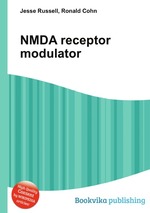NMDA receptor modulator
Jesse Russell Ronald Cohn
бумажная книга
High Quality Content by WIKIPEDIA articles! NMDA receptor modulators (glutamate modulators) are a new form of antipsychotic that are in Phase II FDA study. The first compound studied was glycine which was hypothesized by Daniel Javitt after observation that people with phencyclidine(PCP)-induced psychosis were lacking in glutamate transmission. (PCP is an NMDA receptor antagonist that blocks glutamate) In giving glycine to people with PCP-induced psychosis a recovery rate was noted. From there, it was hypothesized that people with psychosis from schizophrenia would benefit from increased glutamate transmission and glycine was added with strong recovery rates noted especially in the area of negative and cognitive symptoms. Glycine, however, sporadic results aside (dose 60 g/day or 0.8 g/kg, approximately the amount in 300 g of gelatin powder or two kilograms of sunflower seeds) remains an adjunct antipsychotic and an unworkable compound. However, the Eli Lilly and Company study drug LY2140023 is being studied as a primary antipsychotic and is showing strong recovery rates, especially in the area of negative and cognitive symptoms of schizophrenia. Tardive dyskinesia, diabetes and other standard complications have not been noted:


